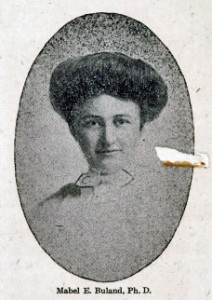This week as I was researching a past president of the University of Puget Sound, I stumbled upon someone I found a bit more interesting in a 1909 edition of The Trail: Mable Electa Buland. The Trail article introduced Buland as a new professor of English at the University, and the article mentioned that at the time at which Buland received her Doctorate, she was the youngest PH.D. in America.
Intrigued, I decided to do some further research into Miss Buland so that I could write a Wikipedia article about her. Buland was raised in the west, and received both her B.A. in 1904 and her M.A. in 1908 from the University of Washington. During the 1904-1905 school year, Buland was an assistant in the Department of Pedagogy at UW, before teaching at Castle Rock High School for a year. She then did graduate work in English at both Columbia and Yale, and received her PH.D. in English from Yale in 1909, making her the youngest PH.D. in America. This was quite a feat, particularly for a woman, considering that in 1900 only 2.8% of women in the U.S. attended college, and yet only about 10 years later, Buland became the youngest person to earn a PH.D. in America.
After completing her PH.D., Buland taught English at the University of Puget Sound for a year (1909-1910) and at Whitman a year later (1910-1911).
After marrying George Norman Campbell in the fall of 1911, Buland stopped teaching, but continued to be involved in education, as she served as the City Superintendent of Schools in Kalama, Washington from 1915-1916. Buland gave birth to a son in February of 1917, and, as was customary at the time, stopped working outside the home.
While the societal expectations for a woman of Buland’s status excluded her from teaching after she had her son, Buland didn’t withdraw from community life. Buland remained involved in the community through “women’s clubs,” which were particularly important at a time when few women had access to education. Women’s clubs provided a more intellectual community for women who had few educational opportunities, and discussed current issues, with a focus on women’s suffrage. In the fall of 1924, when well-known feminist Emma Smith Devoe resigned from her position as vice-chair of the State Central Committee for the Republican Committee, Buland took over the position, which was meat to help establish women’s clubs and to organize Republican women for upcoming elections.
While I have enjoyed researching various personalities through the archives, looking back at my past posts, it becomes apparent that they have pretty much exclusively been about men (just look at how many times I make reference to ridiculous forms of facial hair and you’ll see what I mean). While this isn’t a surprise given the time periods I’ve been dealing with, it was refreshing to come across a woman who wasn’t just another wife who got less than a sentence of recognition in her husband’s bio. Buland deserved to be written about in her own right, at a time when very few women were able to take advantage of newly available educational opportunities, let alone excel in higher education.
By: Kara E. Flynn

